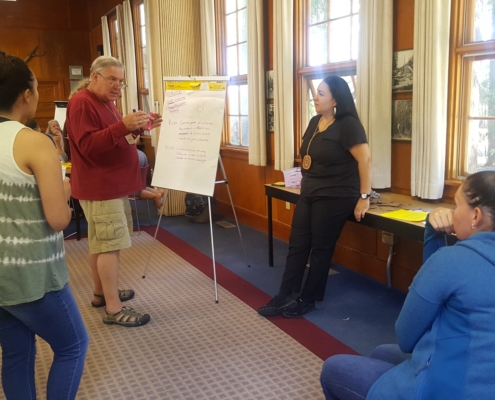Tribal Climate Camp
Philosophy
Philosophy
Tribal Climate Camp gets more refined every year and builds on previous knowledge, input delegates and instructors, and experiences of steering committee members in developing similar trainings.
The overall goal of TCC is to build the capacity of tribal leader teams to address climate change and associated economic, social, cultural, regulatory, and technological trends and impacts within their tribes, between tribes and between tribes and other governments, through strategic alliances with partners across Indian Country and globally.
TCC is designed for early career tribal environmental professionals who have been assigned with some level of responsibility for leading a climate change program, or professionals who know they are about to be assigned.
The teams will work with instructors on understanding lessons from successful tribal climate change programs, building support within a tribe for climate change planning, sustainable fundraising, methodologies for engaging with community members including youth and elders, the evaluation of climate change programs and the basic climate science tools tribes can use in developing programs. Through this curriculum, teams will leave the camp with a plan for how to work together to take leadership on climate change programming within their tribes.

Learning objectives will focus on building a common knowledge base in climate science and on building individual and team capacity to lead and manage for change and adaptation across departments within a tribe and between the tribe and partner agencies and organizations.
TCC Learning Objectives
1. Create awareness of the variety of ways in which the Tribes of the attending teams can address climate change. 2. Build capacities to use knowledge resources in climate-related sciences (social, cultural, biological, physical) applicable to Tribal programming that is flexible enough to deal with constant environmental change. 3. Engender staff capacity for improving Tribal climate change programming. 4. Develop synergy with Tribal members for creating adaptation planning that includes building support within a Tribe for climate change planning processes, including: A. Sustainable fundraising B. Methodologies for engaging community members, including youth and elders C. Approaches for engaging Tribal institutions including Tribal councils D. Ethical conduct in climate science research E. Evaluating climate change programs
TCC Outcomes
Delegates will 1. Develop specific plans of action for building Tribal climate change programming in their Tribes that is responsive to the concerns of the Tribal community regarding climate change; 2. Strengthen relationships with Tribal co-workers that will form a core group of climate change programmers, able to sustain the plan of the action and recruit additional Tribal staff and Tribal citizens who are concerned about climate change; 3. Build a network of other Tribal professionals, scientists and other experts who can be turned to for advice and feedback on climate adaptation programming in the future.
TCC’s curriculum is organized to provide formal and informal opportunities for the teams to engage with the instructors and work on their own. There will be five kinds of educational engagements throughout the week, including: 1. Formal presentations by instructors, 2. Team meetings and work sessions for individual teams to talk among themselves; each team meeting will be attended by a different instructor (or two). 3. Meetings mixing members of different teams for cross-pollination. 4. A final team presentation for feedback from the instructors and interaction with teams from other tribes. 5. Visit to the tribal hosts’ lands.
The TCC hopes that by virtue of attending the camp that each team member will come away with outcomes 2 and 3 above. Outcome 1, the specific plan of action for building a climate change program for each team, will require a presentation to be developed and given by the end of the camp on Friday. The plan of action will involve a document that will also be distilled into slides for a 20 minute presentation, followed by 10 minutes of Q/A and further discussion afterwards. The presentation must have the following elements:
Each team should, ideally, have a document in note form, or set of documents, that have detailed (though rough) information for 1 through 9 above. That information should be distilled into a power point presentation that will be 20 minutes long and will be presented on Friday afternoon.

Native communities are among the most climate-sensitive groups within the Northwest, Southern and Eastern regions of the United States.
P.O Box 66209
Portland, OR 97290
(503) 249 5770
climate@atnitribes.org
